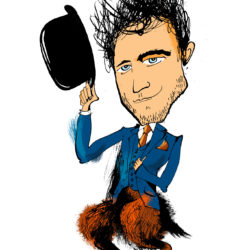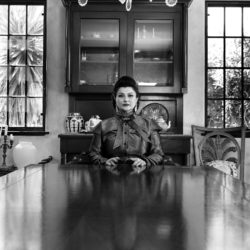How collaboration guru Emilie Rose made her own luck
PHOTOGRAPHER ANDREAUS NEUMANN ART DIRECTOR ELLA MCNANEY HAIR STYLIST KEN PAVES MAKE-UP ARTIST ADAM BREAUCHAUD WARDROBE KHADIJA NEUMANN HAIR STYLIST ASSISTANT GRAHAM NATION PRODUCTION VENI MAGAZINE INTERVIEW ROSE GARDNER


When Rita Ora signed with Adidas Originals in 2014, it was a big moment for sportswear. The first female musician to design for the brand, her range arguably spearheaded the unstoppable athleisure trend. It was soon followed by Rihanna’s Fenty x Puma and Beyoncé’s Ivy Park lines, creating an apparel category worth $48 billion by 2017 in the US alone. And just who was behind that deal? Emilie Rose, that’s who.
Born and raised in London, 34-year-old Rose began her career as a music video model and presenter. Moving to LA in pursuit of television work, she found herself lost and lonely before turning a part-time intern gig at Adidas into her full-time dream job, creating collaborations with celebrities like Ora and Pusha T. Now head of talent at Nyden, Rose has forged a career from her ability to connect brands and tastemakers in meaningful and profitable ways. Her rather avant-garde life hasn’t always been easy, but she’s spun it into gold.
VM: You were friends with Rita Ora and Pusha T before working with them. Have your relationships helped build your career?
ER: If it weren’t for my relationships, I wouldn’t be where I’m at now. A lot of people think it’s the link to the celebrity that’s most important, but you have to build relationships with people within their camp, too, such as record labels, management, and branding agencies.
VM: Why is the collaborative process meaningful to you?
ER: I’m both a dreamer and a doer: see it, speak it, believe it, then make it happen. That really translates into collaboration: bouncing around ideas with a group of people, then actually executing those ideas. Also, I’ve got a creative mind but I don’t have the practical skill set. I can’t sketch, and I’m renowned for taking the worst pictures! So for me it’s amazing seeing the work we achieve as a community.
VM: Has your upbringing played a role in your success?
ER: It’s played such a big part. My parents were never wealthy, but they worked hard to send us to the French Lycée in London, an amazing private school where expat businessmen, diplomats and even royalty send their children. We had kids from all backgrounds that were one big happy family, and it made me a social butterfly from a young age. I have friends all over the world now, and we’ve ended up doing business together.
VM: Tell us more about your family.
ER: My mum was born in a tiny village in Zaire. She moved to Belgium when she was two, worked as a model, and came to London where she met my father. Then she became a jeweler and opened her own shop, and is still successful after 35 years. My mum’s work ethic is incredible; I grew up seeing her work her ass off. My dad was adopted quite young. When he was 16, he ran away and joined the circus. He literally looked after elephants! After that he worked in radio, then started his restaurant group, Feng Sushi.
VM: Embracing diversity is obviously important to you. What changes have you seen within the creative industries?
ER: I’m proud of my sister, Coralie, for winning a diversity award last year for her casting business, Road Casting. The UK and Europe are more diverse than the US on every level. It is really good to see the US following suit a bit more. I couldn’t quite believe the Beyoncé September issue cover was the first time an African American had shot for Vogue in this country.
VM: Do you think people are becoming more aware of milestones like that?
ER: Social media has made me more aware of that type of thing. If it weren’t for Halle Berry saying in her Academy Awards speech, “I’m the first black woman to win an Oscar,” no one would have known. Social media is operating in the same way, making people more aware of these moments so we can celebrate them. I think we are going to see huge changes now. I follow this account @chakabars, which is great for highlighting black history and success across lots of different industries. It’s showing that all fields need more diversity.
VM: Why did you move to LA?
ER: For TV presenting work. I’d had loads of haters in London because I looked “urban” but spoke posh. I would get sent to all these auditions and they’d ask me to change my accent to be more “street.” I thought, “Let me just go to America – they love my accent!” When I said I was moving, I knew people were gunning for me to fail, so all the times I felt like giving up, I’d tell myself, “No way am I going back.”
VM: Looking back, what one piece of advice would you give your 20-year-old self?
ER: At 20 I was a lot more anxious and prone to overthinking. I didn’t know what I wanted to do, and I think it caused a lot of anxiety that I didn’t need to have. So I’d say, “Relax, trust the process, keep doing you. It’s all going to unfold.”



